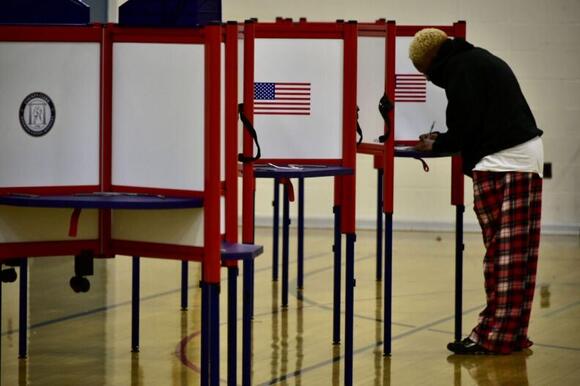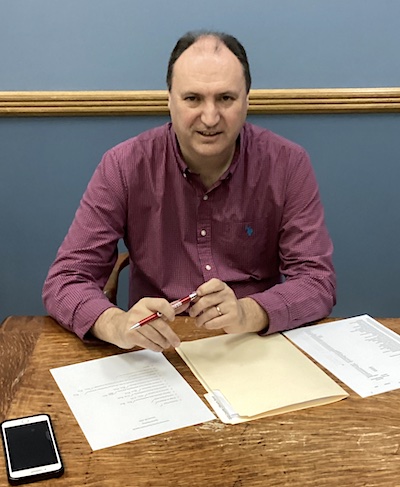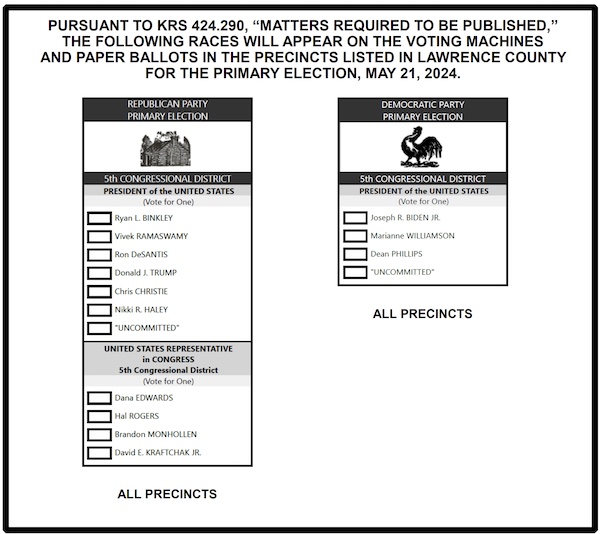
Here’s what you need to know about the 2024 Kentucky primary election
By Sylvia Goodman,

This year’s primary elections are just around the corner , and while the race for president may be at the top of the ballot, a number of important legislative and judicial seats are also up for consideration this year.
All 100 state House of Representative seats are up for grabs, alongside 19 state Senate seats. And don’t forget about Kentucky’s six U.S. representatives that face re-election every other year too. That’s 125 state and Congressional legislative elections with 246 candidates running to grab their party’s nominations ahead of the general election in November.
Kentucky’s primary is Tuesday, May 21st with the polls open from 6 p.m. to 6 p.m. local time. There are three days of early voting from Thursday, May 16 to Saturday, May 18.
This year, almost 40% of legislative races are totally unchallenged. That means that there will be no primary election and there’ll only be one name on the ballot in the general election. The vast majority of those are Republicans.

Republican Lawrence Co. Clerk Chris Jobe said applications for absentees have begun to come in slowly but he foresees a very light turnout, much like SOS Michael Adams who has predicted less than 15% statewide.
“There’s just not much on the ballot for voters to choose from since all the offices are uncontested locally,” Jobe said.

To request a Mail in Absentee Ballot please go to GOVOTEKY.GOV or call The Lawrence County Clerk’s Office at 606-638-4108. The last day to request a ballot was May 7, 2024.
Absentee Voting in Person May 8, 9, 10, 12, 14, 15
8:30am -4:30pm
Lawrence County Courthouse
Earty Voting May 16, 17, 18
10:00am-6:00pm
Lawrence County Courthouse
Election Day May 21
6:00 am to 6:00 pm
Voting Locations Countywide
Asst. Commonwealth’s Attorney Matt Runyon, will be able to ease into the main seat as longtime CA Tony Skeans is retiring. Runyon, 34, is the only candidate for the six year term so the office is not shown on the Primary ballot.
“In the November election, the city and school board races will take place and I expect there will be a lot more interest,” Jobe said. “There are three open school board seats and six city council members so that will bring out a lot more people to vote,” Jobe said. He also said the deadline to run for the October offices is in June so anyone interested in running should be getting ready.
He also said the election is ready to go on his end with modern equipment and poll ready to set up May 21.
*********
Some of those races are for some of the most influential people in Kentucky politics, including both Senate President Robert Stivers and House Speaker David Osborne, the Republican leaders of their respective chambers.
Before you write off the primaries though, there are 20 legislative races this year that will be essentially decided in the primaries — that’s 16% of races with members of just one party running. Lawrence County is one of those 16per cent.
Republican Senator Phillip Wheeler and State Rep., Scott Sharp have no opposition in the Primary nor in the General elections barring na third party race.
Kentucky’s Republican Secretary of State Michael Adams said he expects more races to be decided in the primaries as Kentucky becomes more polarized, a trend that shows no sign of reversing.
“I do think that over time, you’re going to see an increase in primary voting,” Adams said. “Because as the state gets more geographically polarized as Louisville and Lexington get bluer, and as rural areas get redder, the primary is going to be the general. So that’s going to matter more.”
Since Kentucky has closed primaries , those seats will be basically decided by members of that one party. In Louisville’s Senate District 33, for example, Democrats will select one of three candidates, including Minority Floor Leader Gerald Neal, with no Republican challenger at all. Or in state House District 49, Republicans will choose from two candidates, and Democrats will have no choice come the general election.
“You have fewer Republicans that want to put themselves up to run in Louisville for the legislature and fewer Democrats that want to run in, say, Madison County,” Adams said.
State lawmakers have the power over how state tax dollars are spent and create the policies and statutes that govern Kentucky’s institutions.
This year, lawmakers crafted a state budget that sent more than a billion dollars to Louisville initiatives , funded or disinvested in state offices and decided how much money went to the state’s public education system. They passed sweeping legislation to increase penalties on a number of crimes and put in place a statewide ban on street camping. They passed legislation to make finding insurance easier during pregnancy and to study infant and maternal mortality in the state.
In short, the work of legislators has numerous direct impacts on Kentuckians. Adams said that, since expanding early no-excuse voting in the state, the main reason people tell him they don’t vote is because they feel uninformed.
“It’s never ‘Oh, I couldn’t get off of work.’ Maybe it used to be, but it’s not now,” Adams said. “The answer they tell me is, ‘I just didn’t know enough about the candidates and the offices.’”
To find information on more than 180 candidates running in contested primaries in Kentucky this year, check out the Kentucky Public Radio Voter Guide .
Even in a presidential year, when turnout is generally much higher, relatively few registered Kentuckians head to the polls on primary day. Last year, when the governor’s mansion was up for grabs, only 14.5% of registered voters headed to the polls.
While in the past two presidential years Kentucky saw higher primary turnouts at 31.1% and 20.6% respectively, Adams said he wouldn’t be surprised if this year fell flatter. He’s estimating between 10 and 15%.
Adams actually attributed those higher turnout numbers in previous presidential primary years to competitive U.S. Senate races, which Kentuckians won’t see on the ballot this year.
“If you go back to 2012, the last presidential election with no Senate race, the numbers were comparable to what we’re expecting, which is to say around 15%.”
Low voter interest in absentee ballots — which is how Adams determined his estimate — could mean low day-of turnout, and a fairly small portion of the electorate choosing who wins the party nomination. And in that 16% of legislative races basically decided in the primary, a handful of votes could make a big difference.















